The 2018 Occupational Licensing Review
In this policy brief, Platte Institute Policy Director Sarah Curry and Director of Government Relations Nicole Fox review the events which led to the creation of a comprehensive job licensing reform process in Nebraska.
Download this report in PDF format, or click on a link in the table of contents below to be advanced to a particular section.
Table of Contents
Why Is Occupational Licensing an Issue?
Nebraska’s 105th Legislature during the 2017-2018 Biennium
Occupational Board Reform Act, LB299
List of Occupational Licensing Bills in the 2017-2018 Biennium
Introduction
A key component of achieving the Good Life in Nebraska is the ability to pursue your chosen profession in order to provide for yourself and your family.
We frequently ask young children, “What do you want to be when you grow up?” A child’s dreams may lead them to learn a skill or receive education in a particular field, and then find employment, or open their own business. Unfortunately, excessive occupational licensing laws frequently stand in the way of many people trying to follow their dreams and career aspirations.
Figure 1: Trends in Occupational Licensing
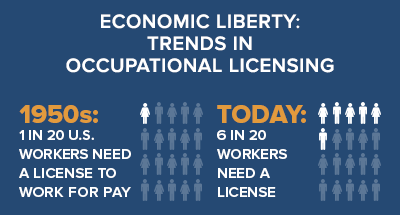
Source: Federal Trade Commission
In the 1950s, less than five percent of the workforce required a license. Today, almost 30 percent of jobs require a license nationally, and in Nebraska, nearly 200 different jobs require a government license. These occupations are not regulated consistently across the country either, with 1,100 occupations requiring a license in at least one state, but only 60 of those occupations being regulated in all 50 states. For example, while physicians are licensed nationwide, Louisiana is the only state that requires a government license for florists.
Why is Occupational Licensing an Issue?
Many of Nebraska’s licensing requirements are more burdensome than its neighboring states and the rest of the country, making it harder to create many higher-wage jobs in Nebraska. Nearly 25 percent of the jobs in Nebraska require a government license. Even if a particular worker does not need government permission to do their job, many of the services they depend on in their daily life may be more expensive or less accessible because of Nebraska’s unnecessary barriers for workers and entrepreneurs.
While some regulation will always be needed, Nebraska’s regulatory policies are unnecessarily limiting entry into occupations or industries in a manner that lessens competition. As a result, fewer new jobs and new businesses are being created in Nebraska than in states which are gaining population and income at Nebraska’s expense.
Imposing job licensing requirements not found in other states also reduces the upward mobility of Nebraska’s workers and entrepreneurs. This ultimately affects Nebraska’s economy because occupational licensing is costly, both to the worker and the consumer.
Dr. Morris Kleiner from the University of Minnesota is considered an expert in the field and has conducted research on occupational licensing and its impact on society. His findings in one study claimed, “Licenses are required for more and more professions, and that has two major impacts: consumers are overpaying for services, and workers are being pushed out of professions. There are tremendous societal costs with little improvement to service, quality, health, and safety.”1
Dr. Kleiner and fellow economist, Dr. Evgeny Vorotnikov, published a paper in 2016 that analyzed occupational licensing among the states, finding that occupational licensing increases income inequality. Those that hold a license will see a small increase in their earnings, yet the income benefit of holding a particular license is not enjoyed equally across the income spectrum of employees. Their research finds,
“…individuals in the lowest part of the income distribution—manicurists, for example—are associated with a gain only 3.6 to 5.6 percent due to licensing, but those in the middle of the income distribution gain 7 to 8 percent. Further, those individuals in the top 30 percent of the income distribution gain 11 to 23 percent. … The results suggest that licensing exacerbates relative income inequality, since higher wage occupations tend to gain more from the regulation relative to lower wage ones. These results underline the importance of examining the licensing effect throughout the earnings distribution.”2
A wide variety of research organizations and industry groups have reached the conclusion that while in some cases licenses may be needed to protect the public, in many instances occupational licensing is a burden to both the licensee and the consumer. This includes the Institute for Justice, the Professional Beauty Association, the Brookings Institution, Pew Charitable Trusts, ACLU, the Mercatus Center at George Mason University, and the Cato Institute to name a few. By determining who can enter a profession, trade, or business, these regulations benefit current license holders, limiting competition and driving prices up for consumers.
Even the Obama Administration decided to look at the research surrounding occupational licensing, publishing a paper by the Department of the Treasury Office of Economic Policy, the Council of Economic Advisers, and the Department of Labor, finding that licensing laws are costing millions of jobs and artificially raising prices for Americans by over $100 billion annually.3
There are nearly 200 occupational licenses in Nebraska, which means about 1 out of every 4 workers in Nebraska must have a license to work. When looking at occupational licensing from a nationwide perspective, Nebraska’s licenses more lower-income occupations than average and also licenses several occupations that are rarely licensed in other states.4
Nebraska also imposes education requirements on some occupations that seem excessive, such as cosmetologists or massage therapists, when compared with other occupations that present a greater risk to the public, like Emergency Medical Technicians or physical therapists.
These burdensome regulations come at a cost. One cost is compliance. License holders must pay in time and money to obtain and retain the license. The other cost is the supply of professionals. Occupational licensing represents a barrier that prevents some people from entering a field. The lower supply, in turn, drives up the price of providing these services to consumers and businesses.
Figure 2: Nebraska National Rankings

Source: Institute for Justice, License to Work 2nd Edition
A study by the Beacon Hill Institute at Suffolk University attempted to quantify the direct compliance cost of occupational licensing on Nebraska’s economy. They found that,
“The agencies with the highest total fees tend to be those that issue the most occupational licenses, such as the Department of Health and Human Services ($62.1 million), which issues licenses or registrations for over 51 different occupations. Some of these licenses are for occupations that would not require advanced training, such as a purveyor of body art, a swimming pool operator or a paid dining assistant at a skilled nursing facility and cosmetologist. The Department of Labor licenses 15 different types of construction contractors, yet the fees are relatively modest at $2.1 million. The Departments of Motor Vehicles, Banking, Insurance and the Game and Parks Commission also generate higher revenues from fees, permits and licenses at $21.5 million, $29.8 million $17.6 and $28.2 million respectfully.”5
While not all the fees collected by these agencies are associated with occupational licensure, it shows that the state collects a substantial amount from individuals and businesses when it comes to fees and licensure. The authors note that one important factor they could not accurately calculate is the impact these occupational licensing regulations have on the private economy. When businesses are forced to spend money on government regulation, this creates an opportunity cost in the form of fewer savings or purchases of new products or items to expand their business. Also, the cost of the resources used to obtain and maintain the license takes away from the productivity of workers, causing businesses to produce less than they have the capacity to produce. While the study was unable to quantify that amount, it is evident that overburdensome occupational licensure and the associated fees represent significant opportunity costs for Nebraskans.
Nebraska’s 105th Legislature during the 2017–18 Biennium
The convening of the 105th Nebraska Legislature began with a continuation of the momentum that started in 2016 with the exemption of hair braiding from the state’s cosmetology license. Senators from all political parties sponsored bills to address issues with occupational licensing in the state. Some called for outright repeal of certain licenses, while others introduced legislation to amend licensure hours, scope of practice, or other specific requirements of licensing for workers.
During the 2017 session, lawmakers passed five occupational licensing and regulatory reform bills that reduced red tape to getting a job or starting a business in Nebraska, all of which passed unanimously. This included licensing reform for real estate agents, dental hygienists, nurses, physicians, audiologists, executive bank officers and loan officers, and motor vehicle salespeople. Three other licensing reform bills, affecting title examiners, school bus drivers, and horse massage therapists were advanced from committee but were not scheduled for legislative debate in 2017.
While Nebraska saw successes in reform for some occupations in 2017, there were other occupations that faced significant obstacles. A 2017 bill to change personal care profession licensure requirements in fields including cosmetology, barbering, and massage therapy faced heavy opposition in committee. The majority of that opposition came from current industry licensees, state licensing boards, and private industry training schools.
That show of force made Health and Human Services Committee members reluctant to advance the bill to a full debate. Instead, many of these professions’ licenses were the subject of interim studies. During this time, more research was done into each profession, and new bills were filed on several of these subjects in the 2018 session, including compromise legislation that reduced licensure hours for cosmetology and barbering.
Another bill that received significant opposition was LB596, a measure to eliminate the equine—or horse— massage license. It was opposed by both the veterinary and massage therapy industries at its committee hearing. Over the 2017 interim, consensus was achieved through a proposed amendment which created a registration process for those in Nebraska wanting to practice equine massage.
In 2018, occupational licensing was once again a main focus of the Legislature, and bills were sponsored and supported by all political parties in the Unicameral. Bills addressing licensure issues were enacted into law for title examiners, school bus drivers, county highway and city street superintendents, public adjusters, psychologists, Emergency Medical Technicians, animal massage therapists, and a host of personal care service professions including cosmetologists, electrologists, estheticians, nail technologists and body artists (tattooist).
Since its introduction, the horse massage license garnered statewide and national attention for inadvertently turning some entrepreneurs into possible criminals. LB596 was introduced by Sen. Groene after hearing from a constituent that they had received a cease and desist order from the state’s Department of Health and Human Services for practicing equine massage. At the time of its introduction, individuals wanting to practice equine massage were required to either work under a veterinarian’s supervision or earn an animal therapist license, which also required a license for practicing massage therapy on people. Nebraska currently has one of the country’s most burdensome licensing requirements for massage therapy. LB596 would have exempted individuals wanting to practice equine massage from this requirement.
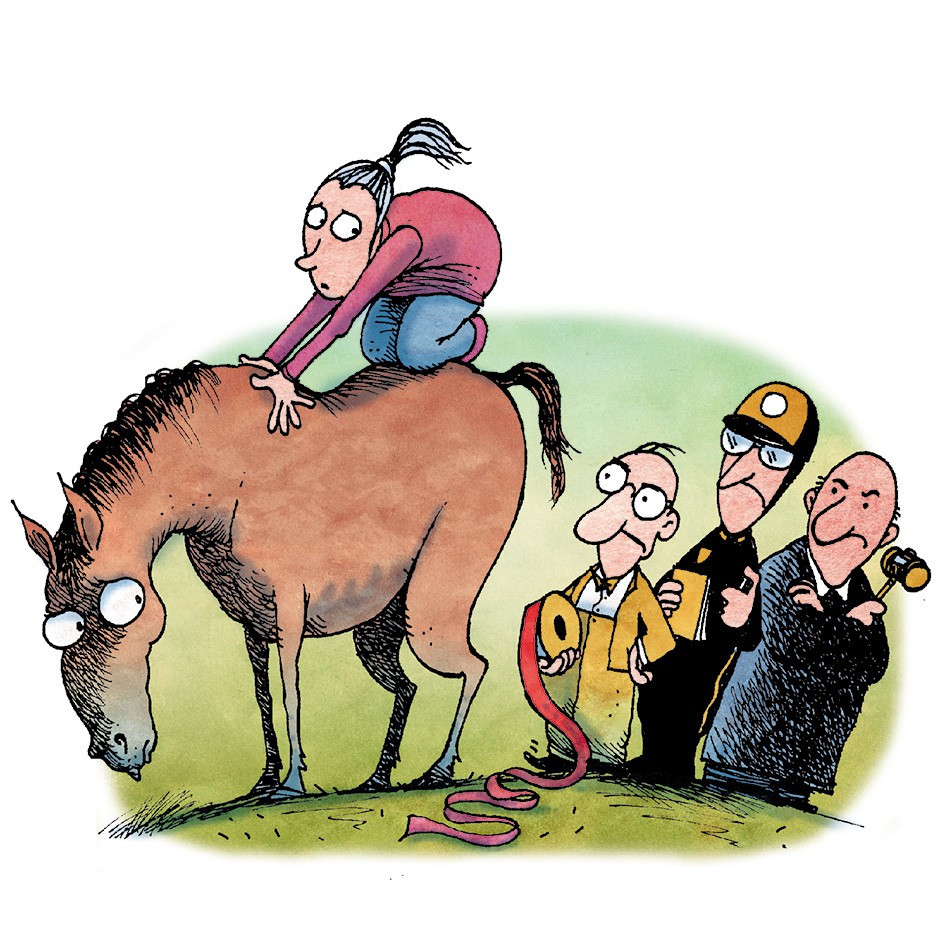
Used with permission/David Clark
Interestingly, during floor debate on LB596, it was questioned why more red tape was being proposed through the registry amendment that had been agreed upon during the interim. Some senators mentioned that failing to register could also cause workers to face criminal penalties. A majority of senators shared this concern, and ultimately, LB596 was passed as originally intended, to fully exempt professionals. In addition to equine massage, the practice of dog and cat massage was also exempted from licensure under the new law. LB596 serves as an example as to how, sometimes, the best way for government to help Nebraska workers and entrepreneurs is to just get out of the way.
Many of the individual licenses that have been repealed or amended over this biennium are because constituents told their senators of the burdensome regulations that were keeping them from working. It’s red tape like this that warrants more routine scrutiny of regulations affecting Nebraska workers.
As each individual occupation received debate, it was made clear that legislation that looks at occupational licensing from a comprehensive approach was also needed. Thankfully, Legislative Bill 299 sponsored by Sen. Laura Ebke, was enacted into law creating the Occupational Board Reform Act. Under the Act, legislative committees will need to review 20 percent of licenses under their jurisdiction annually, in a continuous five-year cycle. This process creates a framework for identifying less restrictive occupational regulations such as private certification, registration, insurance or bonding, inspections, open market competition, or a combination of these approaches.
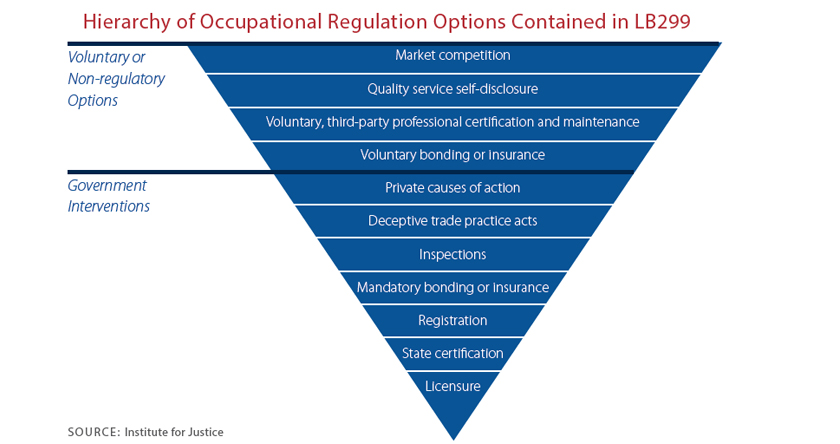
The legislation also included a reform enabling workers to request an advisory opinion from state licensing boards regarding their eligibility to work in a licensed profession prior to beginning a training program. This legislation made national headlines and has positioned Nebraska as a national leader on the occupational licensing reform front. Nebraska become the fourth state to adopt comprehensive occupational licensing reforms.
Occupational Board Reform Act, LB299
The road that ultimately led to LB299’s passage, was one filled with many bumps and detours. LB299 was introduced at the beginning of the first session of the 105th Legislature in January of 2017 and assigned to the Government, Military and Veterans Affairs Committee. Opposition at the committee hearing for LB299 outnumbered bill proponents nearly three to one.
The bill was opposed by state agencies, unions and industry interest groups including the Nebraska Department of Insurance, the Nebraska Real Estate Commission, the Nebraska Geological Society, the Nebraska Board of Accountancy, the Nebraska Board of Barber Examiners, the Nebraska Chapter of the American Contractors Association, a local chapter of the International Union of Elevator Constructors, and a local chapter of the International Brotherhood of Electrical Workers. The opposition did not stop there.
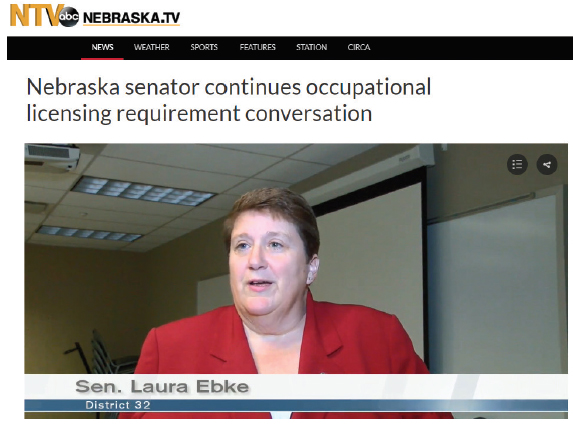
The original version of the bill created an “Office of Supervision of Executive Boards” responsible for conducting the reviews of occupational regulations. Opponents claimed this office would create unnecessary bureaucracy. Because of this concern, LB299 remained in committee in 2017, with the agreement that the sponsoring senator would use the interim to address these concerns with an amendment that eliminated this new office and instead proposed that legislative standing committee staff would be responsible for conducting the reviews of occupational regulations within the jurisdiction of the committee.
During the 2017 interim, an amendment was negotiated and drafted in preparation for the 2018 session. Also during the 2017 interim, the Platte Institute was approached by the ACLU of Nebraska, as they supported the criminal justice component of LB299. A partnership, regarded by some as unlikely, was formed. Together, the Platte Institute worked with the ACLU of Nebraska to promote LB299 through a series of newspaper editorials and town halls across the state. News stations conducted interviews for stories on this collaboration.
By January 2018, the start of the second session of the 105th Legislature, LB299 had significant publicity statewide. LB299 became more favorable with committee members due to the proposed amendment and advanced to General File with five voting in favor of the bill, zero voting against and three abstaining.
Polling in eight legislative districts across the state found that the policy behind LB299 also enjoyed strong support from voters. An average of 62 percent of voters supported a regular review of occupational licensing laws. Voter support varied only slightly by party affiliation, with 67 percent support among Republicans, 64 percent for Democrats, and 60 percent for independents. Only 19 percent of voters said they opposed the policy, which was approximately the same share as those who were unsure.
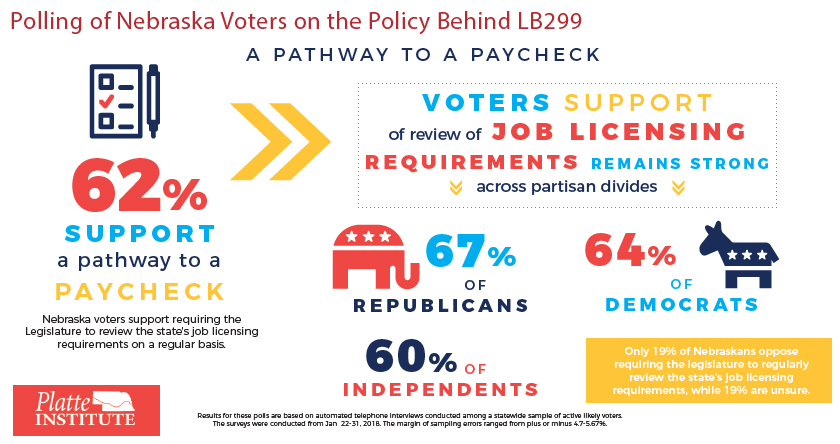
When the General File debate ensued in mid-February, LB299 was once again met with significant resistance. Present in the rotunda were legislative standing committee staff who became vocal about their opposition to the bill, saying they did not have the time to participate in conducting interim reviews. Another obstacle was the Nebraska Medical Association. Although they testified in a neutral capacity during the committee hearing, their stance changed once the bill advanced to General File.
The Nebraska Medical Association recruited two members of the HHS committee to draft an amendment excluding all Department of Health and Human Services licensed occupations from LB299, which would essentially gut the bill of its purview over a wide range of occupational licenses. Their rationale for this amendment was that LB299 would interfere with the Nebraska Department of Health and Human Services’ Credentialing Review Program, also known as the (407) process. This program determines the level of regulation needed for health and human services related professions that are seeking credentialing.
After the initial three of six hours of General File debate, many thought LB299 was dead. Under rules established by the Speaker of the Legislature, the bill needed to secure 33 votes to be rescheduled for another three hours of debate. It was due to the commitment and pragmatism of Sen. Ebke, LB299’s sponsor, that this challenging goal was realized. Sen. Ebke ably negotiated with those initially in opposition to the bill.
After weeks of meetings, assurances that LB299 would not interfere with the (407) review, and the drafting of another amendment to clarify bill language, LB299 was scheduled for further General File debate and advanced to Select File debate in mid-March. Not all opposition had dissipated at this point. A union group for electricians continued to oppose the bill, and sought to lobby some favorable senators to amend the bill to exclude labor unions. This attempt failed. Also at this stage, some standing legislative committee staff continued to oppose the bill, leaving in place the threat that the bill could be killed by a last-minute attachment of a fiscal note calling for additional legislative staff to implement the reforms. This attempt also failed, after an agreement was reached to introduce an interim study to assure adequate legislative committee staffing and adequate resources to carry out the intent of LB299.
LB299 advanced from Select File to Final Reading in early April. Statewide interest in the bill continued, but also, the bill was receiving attention nationally. On April 3, 2018 the Wall Street Journal editorial board published an article highlighting LB299, endorsing it as a national model for licensing reform. Free market think tanks and lawmakers in other states were also watching LB299’s status in the days leading up to Final Reading.
On April 18, 2018, LB299 passed final reading with 45 voting in support, one voting against, and three senators present not voting. The legislation was signed into law by the governor on April 23, 2018, making Nebraska the fourth state in the country to pass a comprehensive occupational licensing reform bill.
Legislative Resolution 401 proposed an interim study to prepare for implementation of the act. The remainder of the 2018 calendar year will be used to carry out the proposed interim study (LR401) to make sure the Nebraska Legislature has the staff, training, and resources needed to identify the lawful occupations and the occupational regulations which will be subject to the Occupational Board Reform Act’s first year of review in 2019.
Occupational licensing reform is not isolated to Nebraska, with a national movement growing in states over the last decade. In 2017, there were 19 states that either introduced or enacted some sort of occupational licensing reform. Three states, including Nebraska, filed bills to eliminate licensing barriers for ex-offenders, helping those with a criminal record enter the labor force.
In 2018, occupational licensing was a topic in over half the country with at least 26 states either introducing or enacting some sort of occupational licensing reform legislation. Policies proposed have taken on a variety of forms. Single occupation reforms have included reduced educational requirements, exam waivers, exemptions or a complete repeal of the license. Other reforms incorporated reciprocity for military spouses and veterans, apprenticeships in place of post-secondary degree programs for those who cannot afford high tuition costs, petition abilities for those with a criminal history, fee waivers for first time applicants, and local licensing preemption.
With the passage of the Occupational Board Reform Act, Nebraska joins four other states (Mississippi, Arizona, Tennessee, and most recently, Louisiana) as national leaders in the movement for a comprehensive reform approach. Nebraska is now in an elite group of states that have annual reviews of their state’s occupational regulations. Other states’ lawmakers have taken notice to Nebraska’s new law and have expressed interest in introducing a proposal using similar policy language in their state.
Conclusion
In recent decades, Nebraska, along with the rest of the country, has seen increasing pressure to impose new occupational licensing barriers upon citizens’ freedom to choose a career path. Nebraskans that want to pursue a particular profession should be allowed the opportunity without unnecessary hoops to jump through, including fees and inconsistent requirements that don’t make sense.
Economic research has demonstrated that most of these laws do not protect the public, but are a barrier to entry for new professionals, primarily supported by those who want to limit competition. Over the past decade, Nebraska has fallen below the national average in job creation and population growth. Until the state stops making it more difficult for people to use their skills, serve others, and earn a living, we will continue to see people leave the state for opportunities elsewhere, or choose other states over Nebraska.
Nebraska has enacted some meaningful reforms to aid in some professions, but there is much more work to be done. Lawmakers must now use the Occupational Board Reform Act to conduct a comprehensive review of all occupational licenses. Creating jobs, boosting entrepreneurial opportunities, reducing prices, and growing incomes are all positive results of occupational licensing reform. Over the next five years, lawmakers will have the ability to make a significant difference in reducing Nebraska’s hidden tax of red tape, and to enable Nebraskans to have more and better economic opportunities.
List of Occupational Licensing Bills Filed During the 105th Legislature (Click here to download in Excel format)
| Bill # | Topic | Final Status |
|
16 |
Changed provisions within the Nebraska Real Estate License Act | Signed into law |
|
18 |
Expanded the scope of practice for dental hygienists and created a new license for dental assistants | Signed into law |
|
88 |
Military spouses to obtain temporary licenses. Creates the Interstate Medical Licensure Compact Commission and adopts the Nurse Licensure Compact. Allows for licensed Audiologists to dispense hearing aids without an a dispensing license. | Signed into law |
|
140 |
Banks and credit unions to be exempt from the department’s license | Signed into law |
|
299 |
Create an Occupational Board Reform Act and change procedures for rules and regulations | Signed into law |
|
345 |
Abstracters | Signed into law |
|
346 |
Motor vehicle, motorcycle, or trailer salesperson license | Signed into law |
|
347 |
School bus permits and qualifications | Signed into law |
|
486 |
Continuing education requirements for insurance licenses | Signed into law |
|
596 |
Exempt horse, dog and cat massage therapy | Signed into law |
|
731 |
Changes to physical therapy, respiratory care, and the Cosmetology, Electrology, Esthetics, Nail Technology, and Body Practice Act, provide for mobile salons and remote dispensing pharmacies, and adopt the Physical Therapy Licensure Compact | Signed into law |
|
733 |
County highway and city street superintendents license | Signed into law |
|
741 |
Change provisions for real property appraisers | Signed into law |
|
743 |
Public Adjusters Licensing Act | Signed into law |
|
1012 |
Self-service storage facility operator insurance producer license | Signed into law |
|
1034 |
Change provisions for health care professionals and health care facilities. Adopt EMS Licensure Interstate Compact and Psychology Interjurisdictional Compact. | Signed into law |
|
341 |
Executive bank officer license revocation and suspension | Amended into LB140, became law |
|
61 |
Creates the Interstate Medical Licensure Compact | Amended into LB88, became law |
|
283 |
Licensed practical nurses | Amended into LB88, became law |
|
342 |
Adopt the Nurse Licensure Compact and allow temporary nursing license for military spouses | Amended into LB88, became law |
|
343 |
Change credentialing and regulation of cosmetology, nail technology, audiology, massage therapy, and barbers | Audiology amended into LB88 which became law, others sent to interim study committees |
|
344 |
Change credentialing and regulation of mental health substance abuse centers | Portions amended into LB1034, became law |
|
425 |
Nurse Practioner Practice Act | Portions amended into LB88, became law |
|
454 |
Allow credit unions to opt out of licensing loan officers | Portions amended into LB140; became law |
|
681 |
Physical Therapy Licensure Compact | Portions amended into LB731, became law |
|
705 |
Change licensure requirements for estheticians and esthetician instructors | Portions amended into LB731, became law |
|
706 |
Eliminate requirements for electrology licensure | Portions amended into LB731, became law |
|
790 |
Allow mobile cosmetology and nail technology salons | Portions amended into LB731, became law |
|
894 |
EMS Personnel Licensure Interstate Compact | Portions amended into LB1034 by AM2322, became law |
|
1107 |
Change provisions for barbers, cosmetologists, electrology, esthetics, nail technology, and body practice art | Portions amended into LB731, became law |
|
36 |
Agencies to review all rules and regulations about issuance of occupational licensing | Government, Military and Veterans Affairs Committee |
|
109 |
Military spouses to obtain a temporary teaching certificate | Education Committee |
|
348 |
Nebraska Potato Development Act | Indefinitely postponed |
|
360 |
Surgical Technologist Registry Act | Placed on General File |
|
364 |
Professional Landscape Architects Act | Placed on General File |
|
507 |
Eliminate the Farm Labor Contractors Act | Business and Labor Committee, subject of interim study committee |
|
588 |
Exempt reflexology from licensure under the Massage Therapy Practice Act | Health and Human Services Committee, Sent to 407 review process |
|
683 |
Military and spouse fee waiver for Nebraska Real Estate License Act | Placed on General File |
|
686 |
Psychology Interjurisdictional Compact | Portions amended into LB1034, became law |
|
687 |
Advanced Practice Registered Nurse Compact | Health and Human Services Committee |
|
834 |
Fee waiver for certain occupational and licensing fees | Health and Human Services Committee |
|
958 |
Provide for licensure of a vehicle as a massage therapy establishment | Health and Human Services Committee |
|
1042 |
Change and eliminate provisions relating to nail technology | Portions amended into LB1107 |
|
1127 |
Additional fees for certain medical professionals under the Uniform Credentialing Act | Placed on General File |
|
1135 |
Alternative Certification for Teachers | Education Committee |
Endnotes
1. University of Minnesota, Humphrey School of Public Affairs, Professor Morris Kleiner’s Research on Occupational Licensing Influences Federal Policy. (2015 May 1). Retrieved from https://www.hhh.umn.edu/news/professor-morris-kleiners-research-occupational-licensing-influences-federal-policy.
2. Kleiner, Morris M., Vorotnikov, Evgeny. (2016 August 9). Analyzing Occupational Licensing Among the States. Page 15. Retrieved from https://perma.cc/EB34-SBA4.
3. The White House. (July 2015). Occupational Licensing: A Framework for Policymakers. Retrieved from https://perma.cc/ U7J2-V9XD.
4. Dick M. Carpenter II, Ph.D., Lisa Knepper, Kyle Sweetland, Jennifer McDonald (November 2017). License to Work: A National Study of Burdens from Occupational Licensing, 16-23. Institute for Justice, Arlington, Virginia. http://ij.org/report/ license-work-2/ ltw-state-profiles/ltw2-nebraska/.
5. Bachman, Paul; Tuerck, David. (April 2017). The Cost of Regulation in the State of Nebraska. The Beacon Hill Institute.
